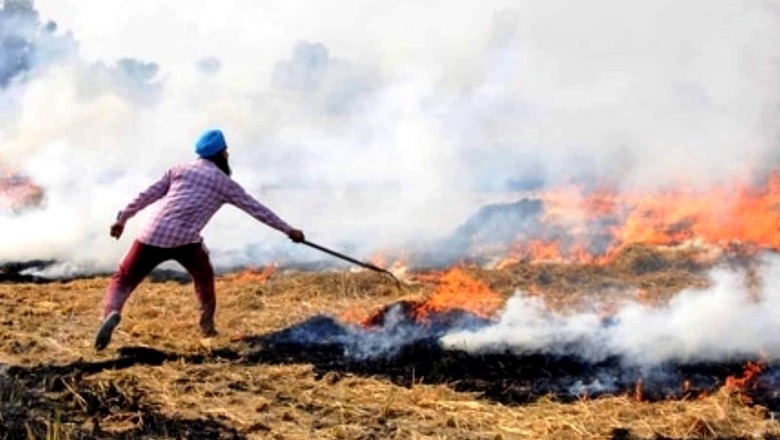
views
A month into the harvesting season, the total number of stubble-burning incidents reported across Punjab and Haryana has fallen by nearly 50% compared to the same period last year. However, it may not be good news for a very long time, as paddy harvesting has now gained pace across the region after the rains ended last week.
According to the data maintained by the Commission for Air Quality Management (CAQM) in NCR and adjoining areas as many as 1,695 fire counts have been reported starting September 15 when the first incident was recorded in Punjab, compared to 3,431 during the same period last year.
Punjab, which has the maximum area under paddy cultivation, reported as many as 1,444 fire counts compared to 2,375 last year, while neighbouring Haryana has seen a reduction from 1,026 in 2021 to 244 so far. As per the data, only five incidents were reported in the districts of Uttar Pradesh that fall under the National Capital Region (NCR) compared to 30 last year.
HEAVY RAINS DELAYED HARVESTING
While the government has been urging farmers not to burn the leftover straw, the stubble burning continues with farmers ruing lack of cost-effective options. The reduction in fire counts, however, is most likely due to the weather conditions, which delayed harvesting across the region. As soon as farmers began reaping the early variety of paddy (Basmati) in mid-September, a heavy spell of rain halted the process, leaving a vast stretch of fields waterlogged for the next two weeks. And just when the farmers resumed harvesting in early October, another spell of rains, this time more over Haryana and parts of the National Capital Region (NCR), left the fields wet and damaged standing crops across several villages.
With the monsoon withdrawal now completed from the region, and a long dry spell ahead for northwest India, harvesting would gather pace starting this week, and lead to an increase in the stubble-burning incidents as well. With the festive season also round the corner, both could lead to a spike in the air pollutants over the region.
AIR QUALITY WORSENS
According to the air quality forecast issued by SAFAR from the Indian Institute of Tropical Meteorology (IITM), the impact of stubble burning on Delhi’s air quality has remained negligible so far. While the weather ensured the smoke intrusion remained low, the pollutants were eventually washed away by the rains, leaving clear skies. “The air has been good so far over Delhi. The fire count was low, and whatever impact it could have had, was reduced to negligible by the rains,” said Dr BS Murthy, senior IITM scientist who heads the SAFAR forecast. However, he warned that the air quality is expected to start deteriorating this week.
“The early morning and night temperatures have begun to fall, and coupled with the dry conditions that now prevail over Delhi, it will become favourable for the pollutants to remain suspended in the air for longer duration. The winds are also relatively calmer, so the dispersion will be low. So it’s most likely to worsen from poor to very poor in the coming days,” he told News18.
Last year, the impact of stubble burning was recorded to be at its peak at 40% during the first week of November, which coincided with Diwali. This year too, the harvesting would be in full swing post October 20, just days before Diwali.
As of Monday, the Air Quality Index (AQI) has worsened from 152 (moderate) last week to 242 (poor) in Delhi, with advisory for children, adults and those suffering from heart/lung ailments to reduce outdoor activities. It was recorded to be the highest for the area around Delhi University where it stood at 313 (very poor). The AQI in Noida, however, was slightly low at 180 (moderate).
CAQM, which has been tracking the fire counts in the region, has been regularly reviewing the position with the neighbouring states who have assured to control stubble burning this year. As per the state governments, as many as 31,700 Custom Hiring Centres and cooperatives have been set up in Punjab, Haryana and UP (NCR) and more than two lakh CRM machinery made available for utilisation in the states. CAQM has also advised the district heads to ensure verification of all reported fire incidents within 48 hours and take strict action against the violators.
Read all the Latest News India and Breaking News here


















Comments
0 comment